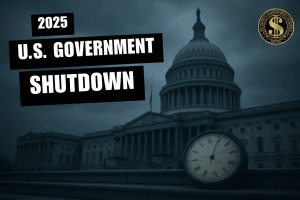(DOGE NEVADA Staff) – The federal government shutdown officially began on October 1, 2025, after Congress once again failed to pass a budget on time.
You’d think that after decades of these fiscal standoffs, Washington would’ve learned how to keep the lights on. But here we are — workers furloughed, services delayed, and taxpayers stuck with the bill.
How We Got Here
Congress missed its legal deadline to pass either a full-year spending plan or even a short-term bill to keep the government open.
Lawmakers argued for weeks over how much to spend, what to cut, and which programs to protect – and when the clock ran out, they were still pointing fingers instead of delivering solutions.
This wasn’t a surprise. Every agency in Washington knew the deadline. Every lawmaker saw it coming.
Yet once again, they treated a routine budget as a last-minute political showdown.
It’s not that Congress can’t do its job – it’s that too many members won’t, because they’d rather grandstand than compromise and govern.
When that happens, the federal government must halt “non-essential” operations; also known as a “government shutdown”.
Thousands of federal workers were sent home, while a limited few will keep working until funding resumes. National parks, loans, permits, and research grants are all affected – the usual fallout from a Washington budget standoff.
Proof That the System’s Broken
This shutdown isn’t just politics. It’s another reminder that the federal government is bloated, inefficient, and far too slow to react. If there really were a “Department of Government Efficiency,” it would’ve failed on Day 1.
- Poor planning: Any well-run business plans ahead for deadlines. Washington doesn’t. Congress knew October 1 was coming – just like it does every year – and still couldn’t agree in time.
- Temporary patches: Instead of long-term budgets, Congress relies on short-term “continuing resolutions.” That’s like paying your rent with a credit card each month. It works – until the interest comes due.
- Wasted money: Every shutdown ends up costing taxpayers more in the long run; contracts stall, projects restart, and agencies lose weeks of productivity they’ll never get back.
- Bad management: Agencies have contingency plans, but if those plans still cause chaos, what good are they? It’s like running a fire drill that always ends in smoke.
- Public trust tanked: When people see government literally turn off, they lose faith that anyone’s in charge. That trust isn’t easy to rebuild.
Shutdown Shockwaves Hit Nevada
You don’t have to live in D.C. to feel the pain. Nevada is taking a hit, too. Roughly 22,000 federal employees in the state are affected according to the Nevada Current.
Small businesses are also caught in the crossfire. The Small Business Administration (SBA) has paused roughly $170 million in federally backed loans, impacting about 320 companies, FOX5 Vegas reported.
All because the most powerful government on earth can’t pass a budget on time.
Lessons from the Government Shutdown
Shutdowns shouldn’t be routine. But they’ve become a regular feature of how Washington operates – and that’s a problem.
Here’s what we should learn from this mess:
-
Deadlines matter. Congress needs to pass real budgets by their real deadlines.
-
Cut the fat. When government gets this big, every argument becomes a disaster. Smaller, leaner agencies would mean fewer shutdowns.
-
Respect taxpayers. The people footing the bill shouldn’t suffer because politicians refuse to lead.
-
Protect the states. Nevada, and frankly every other state as well, need to have clear communication and backup plans if – and when – Washington drops the ball.
Our Government Doesn’t Run – It Stumbles
This latest government shutdown isn’t just a pause; it’s yet another example of what happens when government grows faster than its ability to manage itself.
Every day Washington stays closed, the cost of its inefficiency goes up.
If the federal government were a private business, it would’ve gone bankrupt long ago.
But since it’s run by politicians and bureaucrats who’ve grown too big for their britches, taxpayers keep footing the bill – and waiting for someone in Washington to finally do their job.
The opinions expressed by contributors are their own and do not necessarily represent the views of Nevada News & Views.



